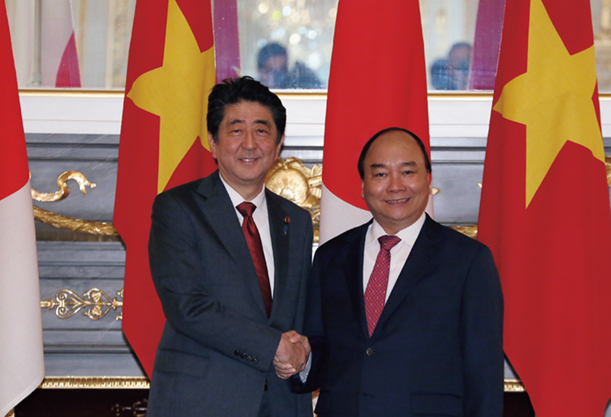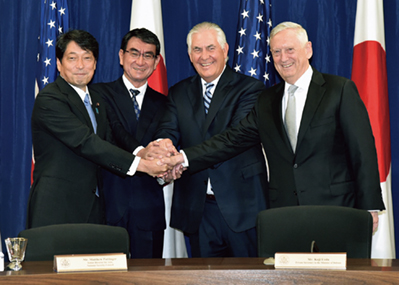Chapter 2 Maintaining a Free and Open International Order Based on the Rule of Law
As described in the previous chapter, the “Free and Open Indo-Pacific Strategy” is based on the concept that a free and open maritime order based on the rule of law is a foundation of the stability and prosperity of the international community. To ensure a free and open maritime order based on the rule of law, it is important to commit to the “Three Principles on the Rule of Law at Sea” advocated by Prime Minister Shinzo Abe: (i) States should make and clarify their claims based on international law, (ii) States should not use force or coercion in trying to drive their claims, and (iii) States should seek to settle disputes by peaceful means. To ensure the widespread compliance with, and the establishment of, the rule of law in the Indo-Pacific region, Japan contributes to strengthening the rule of law through providing support for capacity building in the areas of maritime safety and the development of legal systems.
Section 1 Providing Support for Capacity Building in the Area of Maritime Safety
It is necessary to ensure complete compliance with the rule of law at sea, and to secure freedom of navigation and maritime safety not only for Japan, which depends on maritime transport for its primary resources and energy, but also for the international community as a whole in order to promote the peace, stability and prosperity. To strengthen the security capacity of maritime law enforcement agencies in countries that face the sea lanes in the Indo-Pacific region, as well as to secure safety in maritime transportation that is necessary for the development of the international community, Japan has supplied patrol vessels and equipment to maritime law enforcement agencies of the respective countries. At the same time, as a part of its efforts to strengthen support for improving capability to enforce maritime law, Japan also invites staff of these agencies to Japan or dispatches experts with specialized knowledge on maritime transport to the respective countries.
For example, Japan has provided seven used marine vessels and maritime safety equipment to Viet Nam and conducted theme-based training every year on topics such as maritime crime control. On the occasion of Vietnamese Prime Minister Nguyễn Xuân Phúc's visit to Japan in June 2017, Japan also announced the decision to provide an ODA loan for the development of six patrol vessels operated by the Viet Nam Coast Guard. In the Philippines, Japan has successively provided the Philippines Coast Guard with ten patrol vessels, two large patrol vessels, small high-speed boats, and maritime safety equipment. Japan also provided technical cooperation in supporting capacity building in practical work related to the maritime law enforcement. With regard to Malaysia, Japan has provided the Malaysian Maritime Enforcement Agency with the maritime safety equipment needed to refurbish used patrol boats, as well as dispatched long-term experts and provided support to carry out institutional improvements in training and education. For Indonesia, Japan has provided three patrol vessels and dispatched long-term experts towards capacity building for maritime traffic safety. In November 2017, it also decided to continue offering training from 2018 to improve the capabilities of Indonesia's maritime security agency.
Besides Southeast Asia, Japan also decided in 2016 to provide two patrol vessels to the Sri Lanka Coast Guard, which has approximately 1,300 km of coastline and is positioned at a strategic point along the sea lane that connects East Asia and Middle East/Africa. Similarly, it has also supplied two patrol vessels to the coast guard of Djibouti, which faces the waters off the coast of Somalia and the Gulf of Aden that have come under successive piracy attacks, and offered technical cooperation to the coast guard toward the development of human resources and strengthening of its organization. In these ways, Japan is contributing to coastal safety and the security of socio-economic activities.

Prime Minister Shinzo Abe exchanging handshakes with Prime Minister Nguyễn Xuân Phúc of Viet Nam on the latter's visit to Japan in June 2017 (Photo: Cabinet Public Relations Office)

Foreign Minister Taro Kono and Defense Minister Itsunori Onodera shaking hands with U.S. Secretary of State Rex Tillerson and Secretary of Defense James Mattis at the Japan-U.S. Security Consultative Committee (Japan-U.S. “2+2”) held in Washington D.C., United States, in August 2017.
To continue in such active efforts to provide support for capacity building in the maritime law enforcement, Japan took the opportunity of the Japan-U.S. Security Consultative Committee (“2+2”) held in August 2017 to announce its plans to provide approximately $500 million over the next three years to support capacity building in the area of maritime safety and security for coastal countries in the Indo-Pacific region. In line with this policy, Japan also announced, at the East Asia Summit held in November the same year, plans to steadily provide support worth ¥15 billion over two years as a part of its comprehensive approach towards improving security in the southern part of the Philippines and the Sulu-Celebes Seas in order to realize an “Asia resilient to terrorism.” Based on such announcement of support, Japan will continue provide support in this field in the future.
